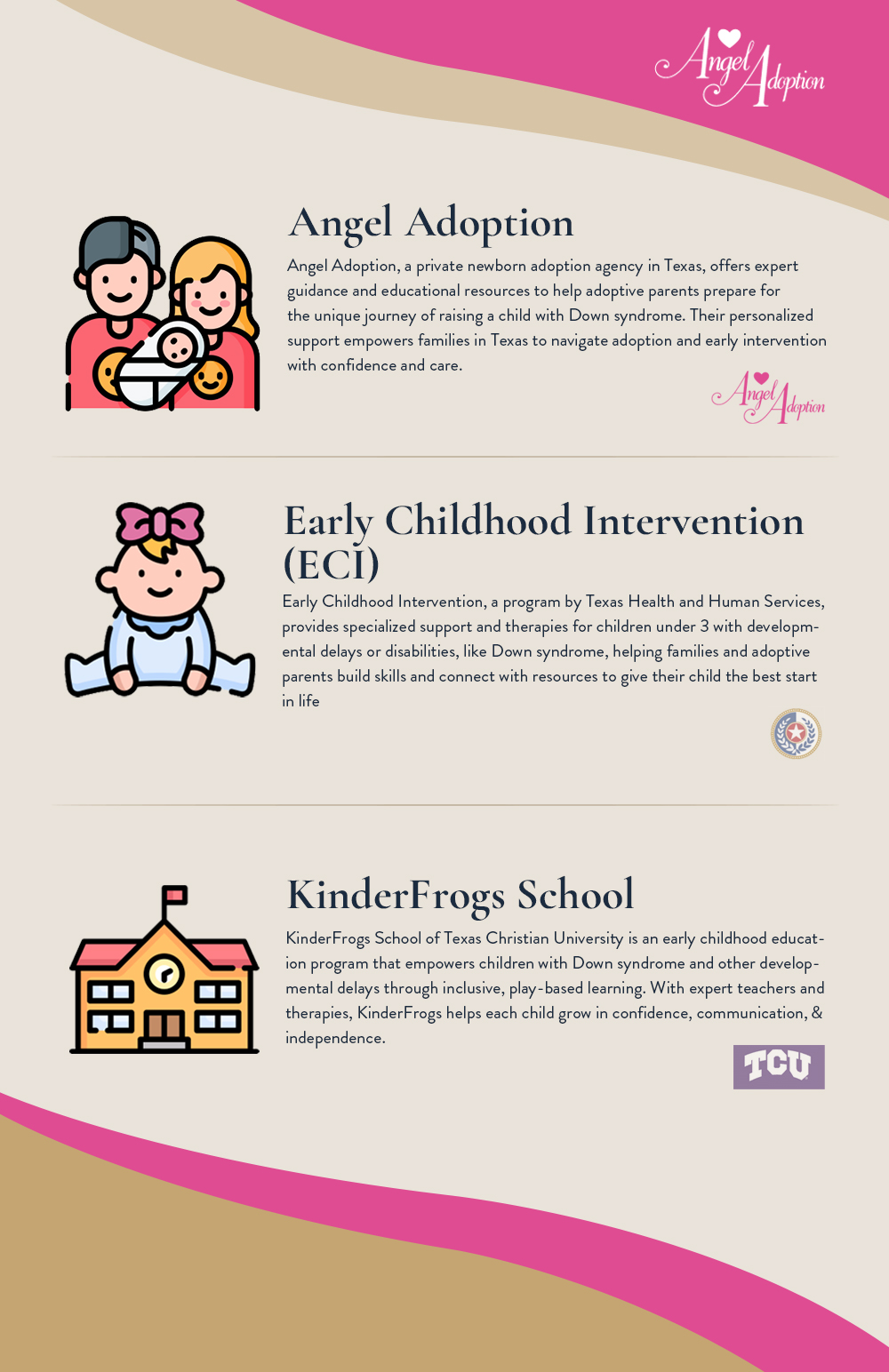Adopting a child with Down syndrome in Texas is a rewarding and life-changing experience. Many children with Down syndrome are waiting for loving families, and Texas offers various support systems to help adoptive parents move through the adoption process.
While this process requires preparation, the joys of parenting a child with Down syndrome are immeasurable. A newborn adoption agency in Texas can guide prospective parents through the necessary steps and ensure they are well-equipped for the journey ahead.
Unfortunately, children with Down syndrome often face longer wait times for placement, making adoption an incredible opportunity to give a child a nurturing home. A study indicated that 87.2% of non-Down syndrome infants who were abandoned were adopted, compared to 31.6% of infants with Down syndrome.
Today, we’ll review the Texas Down syndrome adoption process, including legal requirements, medical considerations, educational planning, and how to find financial assistance. Finally, we’ll discuss how to prepare for your new family member.
Understanding Down Syndrome Adoption
Down syndrome is a genetic condition caused by an extra copy of chromosome 21. There are three types of Down syndrome: Trisomy 21, Translocation Down syndrome, and Mosaic Down syndrome.
- Trisomy 21 is the most common form of Down syndrome. Individuals have three copies of chromosome 21 instead of the usual two. Delays in physical and cognitive development are common, but with medical care, therapy, and support, leading a fulfilling life is absolutely possible.
- Translocation Down syndrome occurs when part of chromosome 21 attaches to another chromosome (typically chromosome 14). This is less common, but those with Translocation Down syndrome generally have the same developmental and medical challenges as those with Trisomy 21. Birth mothers may wish to seek genetic counseling since the translocation can be inherited and may affect future children.
- Mosaic Down syndrome is a rare form of Down syndrome in which some cells have the standard 46 chromosomes while others have 47 (including an extra chromosome 21). Since not all the cells are affected, children with mosaic Down syndrome may have fewer delays than those with Trisomy 21. Parents are still advised to provide early intervention care and ongoing medical and developmental monitoring.
Adopting a child with Down syndrome requires an understanding that your child will share common traits with their peers, but their abilities and health needs can vary widely. Regarding potential medical considerations, children may experience heart defects, respiratory issues, or thyroid conditions, but early intervention and medical care can significantly improve their quality of life.
Early Intervention Services Available in Texas
Texas (and other states) has initiatives in place to help support children with Down syndrome and their families.
At Angel Adoption, we offer a special education course for those looking to become adoptive parents of a child with Down syndrome.
Additionally, among Texas’s many support programs are the Early Childhood Intervention (ECI) Program and the KinderFrogs School of Texas Christian University (TCU) specialized education program. These services connect families with assistance like behavioral, speech, and occupational therapy, as well as early childhood intervention services to help children thrive.

Requirements for Down Syndrome Adoption
An adoption home study is a comprehensive assessment conducted by a licensed social worker or adoption professional to evaluate prospective adoptive parents. This mandatory process happens in all US adoptions. The home study process involves interviews, home visits, and evaluations of your ability to offer a secure environment for a child with Down syndrome.
Adopting a child with Down syndrome in Texas involves additional steps beyond the standard process.
A home study will check to see if a home is child-proofed, but it also looks into the prospective parents themselves. For instance, parents wishing to adopt in Texas will need to gather important documents like background checks, financial records, and medical reports.
Due to the specific medical needs of children with Down syndrome, prospective parents undergo a health assessment and must be of a certain age range to demonstrate their ability to provide long-term care.
The Special Needs Adoption Process in Texas
Texas also requires adoptive parents to complete specialized training, including courses on child development, behavior, and essential information about Down syndrome. Your domestic adoption agency may also ask you for CPR and first aid certifications, special needs training, and parenting classes.
The next step in the process is financial preparation. Demonstrating financial stability is crucial to raising a child with Down syndrome. To prove financial stability during your home study, have documents such as tax returns, pay stubs, bank statements, and a household budget ready.
Children with special needs tend to require additional care, including medical, educational, and daily needs, making financial planning a crucial part of the Texas Down syndrome adoption process. Agencies want to see that you can meet your family’s needs, including medical and educational expenses for a child with Down syndrome.
Medical Considerations and Resources
Children with Down syndrome often have medical needs that call for ongoing care. Some of the most common health concerns include congenital heart defects, hearing and vision impairments, thyroid disorders, and respiratory infections.
Additionally, some individuals may experience gastrointestinal issues, immune system changes, and a higher risk of developing leukemia. While not all children will face these conditions, early and consistent medical care is vital for their well-being.
Texas offers a range of specialized medical resources for children with Down syndrome. The Down Syndrome Clinic at Texas Children’s Hospital offers comprehensive evaluations and individualized care plans.
The Children’s Medical Center of Dallas and the Down Syndrome Clinic of Houston also handle multidisciplinary services, including speech and occupational therapy. The Texas Department of State Health Services has support programs for children with congenital disabilities.
You might also apply to government-funded health insurance programs like Medicaid for free or low-cost medical coverage (if eligible). These services include assistance for children with disabilities. Medicaid can cover essential medical care, therapies, assistive devices, and long-term support services.
Similar benefits can be found with the Children’s Health Insurance Program (CHIP) which offers financial assistance for eligible families, covering necessary treatments, therapies, and medical services.
Families with private insurance should review their policies to understand coverage for specialized care, including developmental and therapeutic support. Prepare for your baby’s medical needs by looking at your insurance coverage requirements and utilizing Texas’ support systems to create a strong foundation for your child’s health and development.

Educational Planning
Most children with Down syndrome experience mild to moderate cognitive delays, which can impact speech, motor skills, and learning. Individuals with Down syndrome can benefit from occupational, speech, physical, and behavioral therapy.
These therapies help build muscle coordination, enhance communication, and make succeeding in and out of school much more manageable. Therapeutic services are available through public school programs, private clinics, and nonprofit organizations across Texas.
ECI Program
Early intervention can significantly improve a child’s cognitive, motor, and communication skills. Texas has the ECI program, which provides various physical and speech therapies for children under three, such as physical therapy for strength, balance, and motor skills.
Other services include occupational therapy to enhance fine motor skills and sensory processing, and developmental therapy to help with cognitive, social, and emotional growth. You can apply to the ECI by getting a referral from your medical practitioner. Then, call the HHS Office for further guidance.
IEPs
Texas public schools must offer Individualized Education Programs (IEPs) so that each child is given support tailored to their strengths and challenges. These education programs can include a range of elements such as access to specialized instruction, classroom and time accommodations, and goal setting and progress monitoring, depending on the specific needs of each child.
Concerning special education rights and advocacy for children with Down syndrome, parents must make sure their child gets appropriate educational accommodations.
The appropriate educational accommodations are out there, and parents are amazing advocates for their children. When additional advocacy support is needed, organizations like Disability Rights Texas and similar groups are there to offer guidance. Disability Rights Texas, in particular, helps families understand special education laws, ensuring children get the necessary resources.
Financial Planning and Support
The adoption process often comes with uncertainties and becoming comfortable with being uncomfortable is something adoptive families are familiar with. One part of these uncertainties is handling the financial element.
Fortunately, Texas has various financial assistance programs, insurance options, and grants to help families provide for their child’s long-term needs.
Texas Adoption Assistance Program (TAP)
Families adopting a child with Down syndrome in Texas may qualify for the Texas Adoption Assistance Program (TAP). This program provides eligible children with monthly stipends and Medicaid coverage, which help cover medical expenses such as doctor visits, hospital stays, and medical equipment like hearing aids.
TAP covers therapies, including speech, occupational, and physical therapy, to support developmental needs. It also helps cover essential services like surgeries, behavioral health services, and other necessary treatments for children with Down syndrome.
Medicaid and CHIP
Insurance coverage is next on your list. Families should review their insurance policies to see if their plans are set up to cover the care that will be needed. While medical and therapeutic care can be costly, Texas Medicaid and CHIP can offer financial relief.
Private insurance plans may also cover essential services such as speech therapy, occupational therapy, and assistive devices. Call your insurance provider to discuss the options available to you, including special types of coverage like out-of-network exceptions.
Nonprofit Organizations and Social Security
Nonprofit organizations like the National Down Syndrome Society (NDSS) offer medical and educational grants, helping families cover medical and educational costs. Disability Rights Texas also shares information on available subsidies, helping parents access financial assistance at both state and national levels.
When adopting a child with Down syndrome in Texas, families often consider establishing a special needs trust to secure financial stability for their child’s future. Planning for government benefits, such as Supplemental Security Income (SSI) and Medicaid waivers, can also help guarantee lifelong support.

Legal Considerations
Working through the legal aspects of adopting a child with Down syndrome in Texas calls for careful planning and understanding of state-specific requirements. Prospective adoptive parents should be aware of the following considerations.
In Texas, adopting a child with special needs may require comprehensive documentation, including personal medical records, birth certificates, parental consent forms, and other documents. These documents are critical for the legal process and ensure that all parties have accurate information about the child’s background and needs.
Understanding guardianship laws in Texas is crucial to making informed medical decisions for your adopted child. Once the adoption is finalized, adoptive parents gain full legal rights, including medical decision-making authority. It’s crucial to know any state-specific regulations that may affect this authority.
Adoptions involving children with special needs may include agreements that specify ongoing support or communication with birth parents. These special needs adoption agreements can outline medical support, therapy, or continued contact expectations, keeping the child’s best interest at heart. Working with an adoption attorney to draft and review these agreements is advisable.
Texas law protects adoptive parents by giving them resources to guarantee a smooth transition. As an adoptive parent, you have the right to make decisions for your child. You can make educational and medical decisions for your child to access stipends and get support from state agencies.
Preparing for Your New Family
After preparing yourself with the necessary educational, medical, and financial information during the special needs adoption process in Texas, you can finally prepare your home for your new arrival.
Building your adoption village can be just as important as preparing your home for your child. When adopting a child with Down syndrome in Texas, having a support system of family, community, and medical professionals can go a long way in raising your special needs child.
Start by childproofing your home, creating a sensory-friendly space, and ensuring accessibility for your child’s needs. Depending on their medical requirements, adaptive equipment like walkers, hearing aids, or feeding tubes may be necessary.
To further prepare, connect with Down syndrome advocacy groups, medical professionals, and support networks to assist you on this new life path with your child. If you need childcare assistance, look for providers experienced in special needs care who understand how to support your child’s development and well-being.
Take the First Step to Adopting a Child With Down Syndrome in Texas
Adopting a child with Down syndrome in Texas is an incredibly fulfilling journey. With the right preparation, education, and resources, you can give a loving and supportive home to a child who needs one.
To prepare yourself for your special needs adoption, fulfill the special requirements, prepare financially and medically, and utilize Texas’ extensive Down syndrome parenting resources. If you’re considering adoption, look at domestic infant adoption agencies in Texas that can guide you through the process and connect you with the right support systems.
Take the next step today by exploring adoption agencies, financial assistance programs, and educational resources. Turn to your support systems or create one by joining your local Down syndrome community. Our adoption counselors are also here to help you build your family: Turn your dream into a reality by starting your adoption adventure now.
Contact Angel Adoption today to find out more about how to get started.







